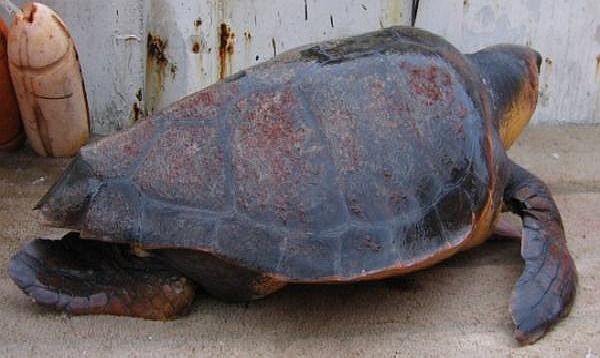Fishing boats from Mexico killed at least 438 endangered loggerhead sea turtles in July and August 2012, according to a new report about illegal and unregulated fishing issued by the NOAA, or National Oceanic and Atmospheric Administration.
According to the report, 438 loggerhead turtles washed ashore on a 26-mile stretch of San Lazaro beach in Baja California Sur, which NOAA says is "likely indicative of a much larger number of turtles that drowned...but that did not subsequently wash up on shore."
According to officials with NOAA, some Mexican fishing vessels haven't complied with multinational agreements to use fishing nets that are safer for sea turtles.
"We have in place certain requirements with respect to how you fish — there's regulations about what to do if you accidentally catch a sea turtle, how to avoid interacting with those animals," says Russell Smith, NOAA's deputy assistant secretary for International Fisheries. "When we have fisheries that can't or won't do the same thing, it undermines our efforts to try and preserve these animals."
In its report, NOAA identified nine other countries, including Colombia, Ecuador, Ghana, Italy, Panama, South Korea, Spain, Tanzania, and Venezuela that had multiple "illegal, unreported, and unregulated" fishing incidents in 2011 and 2012 that threaten both marine ecosystems and the American fishing industry.
Mexico was the only country in the report named for the "illegal bycatch" of turtles and other endangered animals. Other countries were cited for cutting the fins off of sharks, littering, and overfishing.
Besides being an environmental issue, NOAA says that the report is intended to "level the playing field" for American fishermen who use more expensive, but safer, fishing methods.
"It's more expensive to do the right thing than it is to just let your gear tangle with turtles," Smith says.
Over the next two years, NOAA will work with the identified countries in order to make sure its boats are honoring international agreements about overfishing, responsible fishing, and pollution. If those countries don't improve their fishing practices, NOAA could recommend that fishing ships from those countries be denied entry to American ports, officials say.
David Schorr, fisheries governance manager of the World Wildlife Fund, says overfishing is a "ubiquitous" problem and that "it involves most major commercial species."
"The more valuable the species, the greater the pressure for there to be illegal fishing," he says. "We are eating a lot of illegally caught fish without intending to do so." Since 2011, NOAA has worked with six countries that had multiple cases of illegal fishing and did not have to close any ports.
"We had an extensive consultation with governments about how they can improve their fishing practices," says Elizabeth McLanahan, acting director of NOAA Fisheries' Office of International Affairs. "So far, the process has been working."



